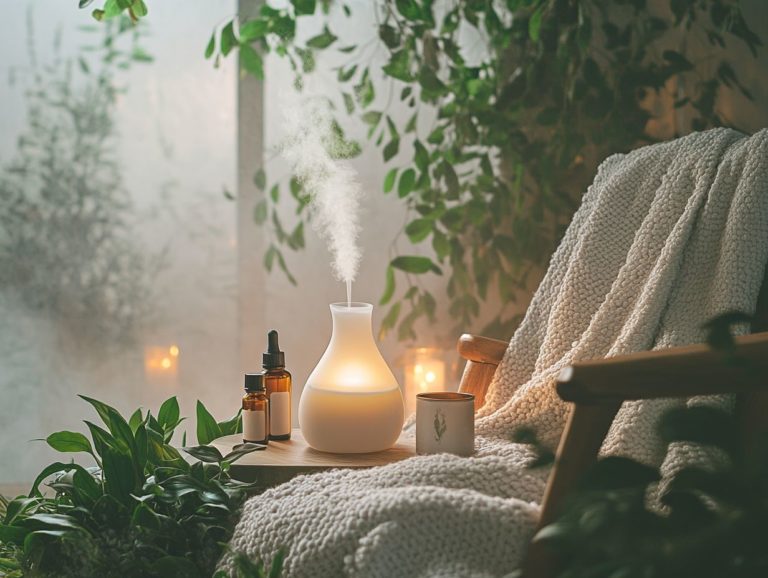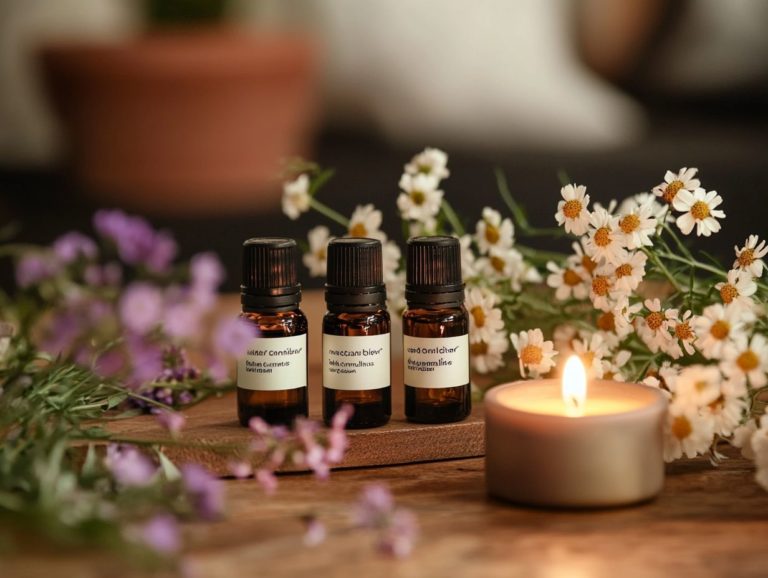Exploring the Benefits of Rhodiola for Anxiety
Anxiety impacts millions of individuals around the globe, often resulting in debilitating symptoms that disrupt daily life.
While traditional therapies certainly have their merits, many are discovering the benefits of natural remedies like Rhodiola, an adaptogenic herb renowned for its potential to alleviate stress and enhance mental well-being.
This article delves into the nature of anxiety, exploring both the historical and contemporary uses of Rhodiola, highlighting how it can be pivotal in managing anxiety effectively.
You ll also uncover practical tips for selecting and seamlessly incorporating Rhodiola into your routine to maximize its benefits.
Discover how this incredible herb can help you find relief from anxiety.
Contents
Key Takeaways:

- Rhodiola has a long history of use in traditional medicine and offers promising benefits in managing anxiety.
- Rhodiola helps manage anxiety by balancing brain chemicals and lowering stress hormones.
- It is important to consult with a healthcare professional and carefully choose the type and dosage of Rhodiola to incorporate into your anxiety management plan.
Understanding Anxiety
Anxiety, a common mental health condition, presents itself as overwhelming worry, fear, or apprehension that profoundly influences your daily life. Its origins can vary widely, stemming from genetic predispositions to environmental triggers like stress and chronic fatigue.
Grasping the nature of anxiety is essential for cultivating effective coping strategies and enhancing your mental resilience to navigate life’s challenges.
Definition and Causes
Anxiety is an emotional state that manifests as tension, persistent worries, and physical changes, such as elevated blood pressure.
If you find yourself grappling with anxiety, you might experience a variety of symptoms, including restlessness, fatigue, and irritability. These can present in different forms, such as generalized anxiety disorder (GAD) or panic disorder.
GAD often leads to chronic worry about numerous aspects of life, while panic disorder is characterized by sudden, intense episodes of fear that come with physical symptoms like heart palpitations and shortness of breath.
The causes of these disorders are often complex, involving chemical changes in the brain, environmental stressors like traumatic experiences or ongoing stress, and even genetic tendencies. Such factors affect not only your emotional well-being but also your thinking abilities, making concentration and decision-making challenging.
The unyielding nature of anxiety can contribute to chronic fatigue, leaving you feeling drained and overwhelmed. This often creates a cycle that exacerbates mental health struggles, making it even more difficult to break free from its grasp.
Traditional and Modern Uses of Rhodiola
Rhodiola rosea, an adaptogen renowned for its stress management and fatigue reduction, is a remarkable herbal supplement recognized for its adaptogenic properties. For centuries, it has been employed to elevate energy levels, combat fatigue, and sharpen mental clarity.
This esteemed plant, hailing from the Russian Federation, holds a prominent place in traditional medicine, particularly for its effectiveness in managing oxidative stress and chronic inflammation.
Join the many who are discovering the calming effects of Rhodiola and take the first step towards a more balanced life!
History and Cultural Significance
Rhodiola rosea boasts a rich history, deeply intertwined with the traditions of the Russian Federation and other cultures, where it has long been revered as a powerful stress-relieving herb.
This remarkable herb was a go-to for ancient healers aiming to bolster physical stamina and enhance thinking skills, especially for those enduring the harsh climates of Siberia. Traditionally, it was employed to alleviate fatigue, sharpen mental clarity, and promote emotional balance.
These qualities made it a favored remedy among warriors and laborers alike.
In various cultures, particularly in Scandinavia and Mongolia, Rhodiola was highly sought after for its reputed ability to combat stress and boost resilience, enabling individuals to thrive even in the most challenging environments.
Its historical applications reflect a profound understanding of plant-based remedies that catered to both mental and physical wellness, illustrating a timeless wisdom that remains relevant today.
Current Applications for Anxiety

Today, you may find that Rhodiola rosea is gaining recognition for its effective applications in managing anxiety. Its adaptogenic properties can help you manage stress and reduce fatigue, making it a valuable ally in your wellness toolkit.
Recent studies have underscored its potential to lower cortisol levels and enhance mental capacity a key player in the anxiety game. Research suggests that a daily dosage of 200 to 400 mg can effectively alleviate anxiety symptoms.
When you integrate Rhodiola into a comprehensive anxiety management plan, it complements other therapeutic strategies like talk therapy and lifestyle changes, enhancing your overall well-being.
If you’re dealing with ongoing anxiety, Rhodiola could be very beneficial, particularly with its unique ability to promote emotional resilience and mental clarity.
Don’t wait to explore its potential!
How Rhodiola Can Help with Anxiety
Rhodiola rosea has captured your attention with its impressive potential to alleviate anxiety. This incredible herb works in several ways to improve how you feel, enhancing cognitive function while effectively combating oxidative stress.
By modulating neurotransmitter levels and supporting stress management, this herbal adaptogen presents promising benefits for those who handle anxiety disorders.
Mechanisms of Action
The mechanisms of action of Rhodiola rosea intricately weave together to enhance your cognitive function, modulate neurotransmitter levels, and mitigate oxidative stress.
By directly influencing the balance of neurotransmitters like serotonin and dopamine, Rhodiola offers you potential relief from anxiety and depression symptoms. This remarkable adaptogenic herb is thought to boost serotonin levels, fostering a sense of well-being, while also amplifying dopamine’s role in mood regulation and motivation.
Moreover, Rhodiola has strong antioxidant properties that combat oxidative damage while enhancing cognitive functions in the brain, ultimately promoting improved neural health.
These combined effects not only bolster your emotional resilience but also contribute to overall cognitive clarity, making Rhodiola a compelling choice for anyone looking to naturally alleviate stress and elevate their mental state.
Evidence from Studies and Research
Many studies show the great benefits of Rhodiola rosea for tackling anxiety, and similar natural remedies like Tai Chi for anxiety reveal impressive potential to boost cognitive function and alleviate fatigue.
Researchers have discovered that this remarkable adaptogenic herb not only reduces anxiety levels but also enhances your overall mental resilience. One particular study found that participants who integrated Rhodiola into their daily routines experienced notable decreases in stress and anxiety symptoms after just a few weeks.
The findings suggest a strong connection between Rhodiola’s mood-enhancing effects and its ability to combat fatigue, making it an enticing option for those seeking natural remedies for mental well-being.
In essence, these studies collectively underscore Rhodiola’s versatility, positioning it as not just an anxiety reliever, but also a holistic supplement that supports your overall mental health.
Choosing and Using Rhodiola
To effectively choose and use Rhodiola rosea, it’s essential for you to understand the recommended dosages, potential interactions, and possible side effects. This knowledge will help you maximize its benefits as a herbal supplement.
Types and Dosage Recommendations

There are several forms of Rhodiola rosea available. Each form has specific dosage recommendations. These are essential for safe use and help maximize effectiveness in reducing fatigue and managing anxiety.
Capsules are probably the most popular option, thanks to their convenience and precise dosing. You ll typically find daily doses recommended in the range of 200 to 600 mg.
If you re someone who enjoys a bit more culinary creativity, powdered forms might be your go-to. They allow you to easily blend Rhodiola into smoothies or other meals, with suggested daily intakes usually around 1 to 2 grams.
For those who prefer a more immediate effect, tinctures, or liquid extracts made from the herb, might be the ideal choice. They offer rapid absorption and are generally taken in doses of about 1 to 2 ml, perfect for anyone seeking swift relief.
With all these options at your disposal, you can select the form that best fits your lifestyle and individual needs, ensuring you reap the optimum benefits from this remarkable adaptogenic herb.
Possible Interactions and Side Effects
While Rhodiola rosea is generally safe for most individuals, it’s important to understand the potential interactions and side effects that may accompany this herbal supplement.
You should be aware that some users might encounter side effects like dizziness, dry mouth, or gastrointestinal discomfort after taking Rhodiola. In rare instances, more serious reactions can occur, such as an increased heart rate or difficulty sleeping. Pay close attention to any unusual changes in your body.
Rhodiola may interact with some medications, particularly those that influence mood, hormones, or blood pressure. Therefore, it’s essential to consult with a healthcare professional before starting the supplement to ensure your safety and prevent complications with your current treatments or health conditions.
Incorporating Rhodiola into Your Anxiety Management Plan
Incorporating Rhodiola rosea into your anxiety management plan can offer significant support for stress management and overall mental well-being. Use simple strategies to unlock the full power of Rhodiola!
Tips and Strategies for Maximum Benefits
To truly unlock the maximum benefits of Rhodiola rosea, you ll want to embrace a variety of strategies that enhance its stress-relieving effects and elevate your mental alertness.
Timing is crucial; take Rhodiola in the morning for an energy boost, while an afternoon dose might just be the lift you need to fend off fatigue.
Consider pairing this remarkable herb with others like ashwagandha or ginseng. This combination could amplify its effects, creating a well-rounded support system for your overall wellness.
Incorporating lifestyle changes, such as regular exercise, a balanced diet, and sufficient sleep, can further optimize the herb’s impact. Consistency is key; by adhering to your regimen and keenly monitoring your individual responses, you ll find the ideal dosage and timing to ensure you achieve the best results over time.
Frequently Asked Questions
What is Rhodiola and how can it help with anxiety?

Rhodiola is a herb that has been used in traditional medicine for centuries. It is known for its stress-relieving effects, meaning it helps the body adapt to stress. Studies have shown that Rhodiola can help reduce symptoms of anxiety by improving mood, reducing fatigue, and increasing energy levels.
What are the benefits of using Rhodiola for anxiety?
Research shows that Rhodiola can greatly improve anxiety symptoms. It reduces stress, lifts mood, and can boost mental performance while generally having fewer side effects than traditional medications.
How does Rhodiola work to reduce anxiety?
Rhodiola regulates the body’s response to stress. It increases serotonin and dopamine, chemicals in the brain that help control mood, and keeps cortisol, the stress hormone, balanced.
Is Rhodiola safe to use for anxiety?
Most people find Rhodiola safe and effective. However, always consult a healthcare professional before starting any new supplement, especially if you’re on medication or have health issues.
What is the recommended dosage of Rhodiola for anxiety?
The usual dosage for anxiety is 200-600mg per day. Start with a lower dose and gradually increase as necessary, following the label instructions and your doctor s advice.
Can Rhodiola be used in combination with other medications?
Rhodiola may interact with certain medications. Always consult your doctor before combining it with other treatments to monitor any potential side effects.






